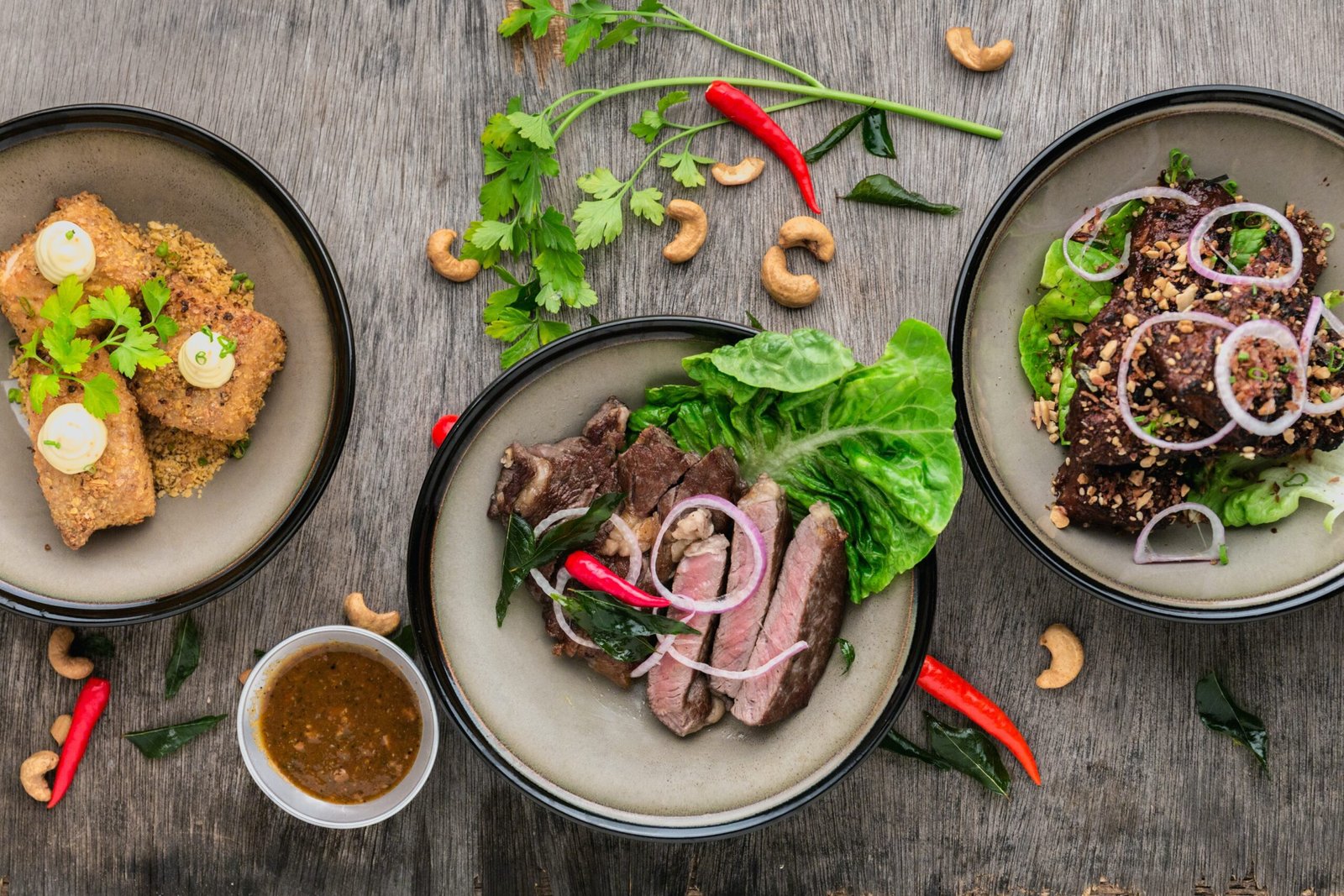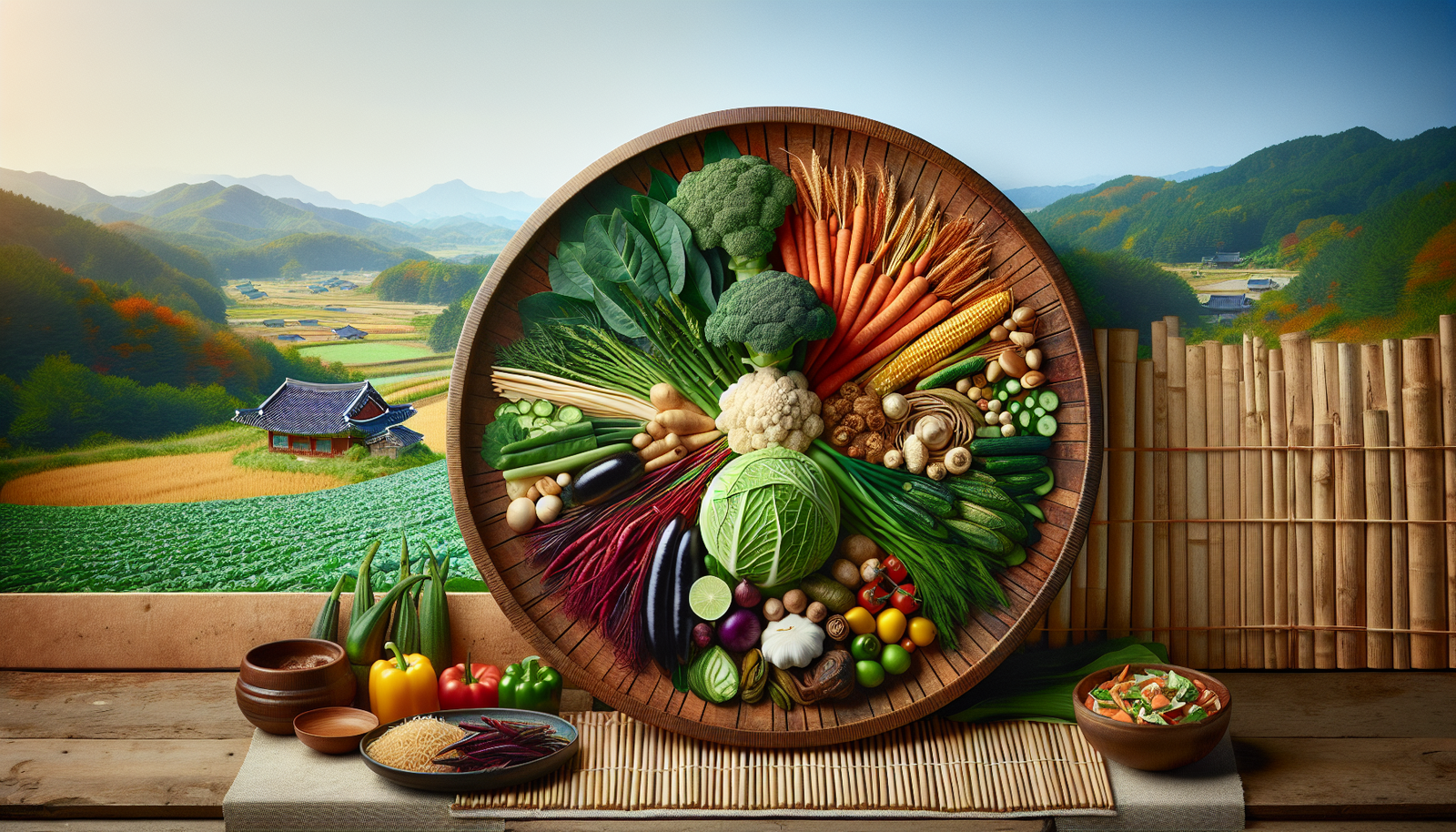In the world of Korean cuisine, a new dominant player has emerged – sustainability. With its focus on using locally sourced ingredients, minimizing food waste, and promoting ethical farming practices, sustainability has steadily become a driving force behind the current Korean cooking trends. From the bustling streets of Seoul to the quaint countryside, chefs and home cooks alike are embracing this newfound approach, not only to satisfy taste buds but also to protect the environment and support local communities. Join us on a culinary journey as we explore the crucial role sustainability plays in shaping the vibrant and ever-evolving landscape of Korean cuisine.

Sustainability and Korean Cuisine
Korean cuisine is not only known for its bold flavors and unique dishes but also for its commitment to sustainability. In recent years, there has been a growing awareness of the importance of sustainable practices in the culinary world, and Korean cooking has embraced this movement wholeheartedly. From traditional culinary practices to innovative approaches, sustainability is at the forefront of Korean cuisine. By exploring the importance of sustainability in Korean cooking, the traditional culinary practices that promote sustainability, and the social and environmental impact of sustainable Korean cooking, you will gain a deeper understanding of how Korean cuisine is more than just a delightful dining experience – it is a way to create a sustainable future for our planet.
The Importance of Sustainability in Korean Cooking
Sustainability plays a vital role in current Korean cooking trends for several reasons. Firstly, with the increasing awareness about climate change and its devastating effects, chefs and home cooks alike are recognizing the urgent need for sustainable practices. Secondly, Korea has a rich culinary heritage that is deeply rooted in the country’s agricultural practices. Therefore, sustainable cooking is not just about protecting the environment, but also about preserving the cultural traditions that have shaped Korean cuisine for centuries. Lastly, as the dining preferences of consumers shift towards more ethical and environmentally-conscious choices, Korean restaurants and food businesses have recognized the importance of sustainability as a key factor in attracting and retaining customers.
Traditional Korean Culinary Practices
To truly understand the sustainability of Korean cuisine, it is essential to delve into the traditional culinary practices that have been passed down through generations. One of the most striking aspects of Korean cooking is its emphasis on fermentation. Fermentation not only enhances the flavors of ingredients but also extends their shelf life, reducing food waste. Kimchi, the iconic fermented cabbage dish, is a prime example of how fermentation is deeply ingrained in Korean culinary traditions. By fermenting vegetables and spices, Koreans are able to create complex flavors while preserving seasonal produce.
Another cornerstone of Korean cooking is “jang,” a term used to describe various fermented pastes and sauces. These jangs serve as the base for many Korean dishes and are made from soybeans, sesame seeds, and other natural ingredients. By utilizing jangs, Korean chefs can reduce the reliance on meat and seafood as flavor enhancers, thus promoting plant-based cooking and reducing the environmental impact of the food industry.
Additionally, seasonal cooking is a fundamental aspect of Korean cuisine. By embracing local produce that is in season, Korean cooks ensure that ingredients are fresher, taste better, and have a minimized carbon footprint. Seasonal cooking not only supports local farmers and reduces transportation emissions but also fosters a stronger connection between people and the natural world.
Sustainable Sourcing and Ingredients in Korean Cuisine
When it comes to sustainable sourcing and ingredients, Korean cuisine has much to offer. Traditionally, Korean cooking heavily relies on local and seasonal ingredients, which inherently promotes sustainability. By utilizing locally sourced ingredients, Korean chefs can reduce the environmental impact of transportation and support local farmers.
In recent years, there has been an increasing focus on plant-based Korean cuisine. With the rising demand for vegetarian and vegan options, Korean chefs have been innovating dishes that showcase the flavors and versatility of plant-based ingredients. This shift towards plant-based cooking not only reduces the carbon footprint but also promotes healthier and more sustainable eating habits.
Moreover, sustainable seafood plays a significant role in Korean cooking. The coastal geography of Korea has facilitated a rich seafood culture, but overfishing and unsustainable practices have threatened marine ecosystems. To address this issue, Korean chefs and seafood suppliers have started to prioritize sustainably sourced seafood. By choosing sustainable options and promoting responsible fishing practices, Korean cuisine can continue to delight seafood lovers without compromising the health of our oceans.

Innovative Approaches to Sustainable Korean Cooking
As sustainability becomes increasingly important in the culinary world, Korean chefs are crafting innovative approaches to meet the demands of environmentally-conscious diners.
Plant-based Korean cuisine has gained significant popularity, particularly among those seeking meat alternatives. Chefs are exploring plant-based proteins like tofu, tempeh, and seitan, and infusing them with traditional Korean flavors. These plant-based creations not only provide delicious alternatives for vegetarians and vegans but also contribute to a more sustainable food system by reducing the environmental strain caused by meat production.
The reduction of food waste is another area where Korean cooking excels. With a focus on fermentation and preservation techniques, Korean chefs have perfected the art of transforming leftover ingredients into new and exciting dishes. By creatively using every part of an ingredient and reimagining leftovers, Korean cuisine plays a crucial role in minimizing food waste.
Sustainable seafood also remains at the forefront of innovation. Chefs are exploring lesser-known fish species, eliminating bycatch, and utilizing every part of the fish to ensure minimal waste. Through creative cooking methods and a commitment to sustainability, Korean chefs are revolutionizing the seafood scene.
Social and Environmental Impact of Sustainable Korean Cooking
The social and environmental impact of sustainable Korean cooking extends far beyond the dining table. Korean cuisine serves as a catalyst for community engagement and education, promoting a deeper understanding of sustainable practices and their importance. By hosting cooking classes, workshops, and community events, Korean chefs inspire individuals to adopt sustainable cooking practices in their own homes and communities.
In addition, sustainable Korean cooking fosters biodiversity and supports ecosystem health. By embracing local and seasonal ingredients, Korean chefs contribute to the preservation of unique plant varieties and the reduction of monoculture farming practices. By promoting the use of traditional fermentation techniques and jangs, Korean cuisine helps maintain microbial diversity, which is essential for a healthy and resilient ecosystem.
Furthermore, by minimizing the carbon footprint of the food industry, sustainable Korean cooking plays a crucial role in combatting climate change. By sourcing locally, reducing food waste, and promoting plant-based options, Korean chefs are actively working towards a more sustainable future. These efforts not only contribute to the reduction of greenhouse gas emissions but also inspire other culinary cultures to implement sustainable practices.

Sustainability in Korean Food Businesses
Beyond the kitchen, sustainability has become a core value for Korean food businesses. Sustainable restaurants and food enterprises are emerging, showcasing their commitment to environmental stewardship and ethical practices.
Sustainable restaurants prioritize ingredients sourced from local farmers and sustainable suppliers. These establishments go beyond offering delicious food and focus on delivering a dining experience that aligns with sustainable values. From energy-efficient lighting and water-saving fixtures to composting and recycling programs, sustainable restaurants consider every aspect of their operations to minimize their environmental impact.
Furthermore, eco-friendly packaging and dining practices have become increasingly prevalent in Korean food businesses. From biodegradable takeout containers to reusable utensils, these initiatives aim to reduce single-use plastic and promote waste reduction. By providing sustainable packaging options and implementing recycling programs, Korean food businesses contribute to a more sustainable food service industry.
Food waste management systems also play a crucial role in Korean food businesses. These establishments recognize the importance of properly managing and disposing of food waste to minimize environmental harm. Through composting programs and partnerships with local farmers and organizations, Korean food businesses actively work towards reducing food waste and diverting it from landfills.
The Future of Sustainability in Korean Cuisine
The future of sustainability in Korean cuisine is promising, with various initiatives and collaborations shaping the culinary landscape.
Government initiatives and policies are essential in promoting sustainability in the food industry. Korean government agencies are working hand in hand with chefs, farmers, and food entrepreneurs to develop regulations that promote sustainable sourcing, reduce food waste, and encourage the adoption of eco-friendly practices. By providing support, incentives, and educational resources, the government plays a vital role in shaping a sustainable future for Korean cuisine.
Collaborations among chefs, farmers, scientists, and sustainability advocates are key to driving innovation and progress in Korean cooking. By working together, these stakeholders can share knowledge, exchange ideas, and find creative solutions to the challenges faced by the food industry. Collaborative efforts can lead to the development of new sustainable practices, the promotion of biodiversity, and the generation of awareness about sustainable eating habits.
Consumer awareness and demand are paramount in driving the sustainability movement forward. As diners become more informed about the environmental impact of their food choices, they are increasingly seeking out sustainable dining options. By supporting restaurants and food businesses that prioritize sustainability, consumers influence the market and create a demand for more sustainable practices. A well-informed and conscious consumer base is crucial in shaping the future of sustainable Korean cuisine.
In conclusion, sustainability plays an integral role in current Korean cooking trends. From traditional culinary practices that embrace fermentation and seasonal cooking to innovative approaches that focus on plant-based alternatives and reduction of food waste, Korean cuisine demonstrates its commitment to the environment and cultural heritage. The social and environmental impacts are far-reaching, as sustainable Korean cooking engages communities, promotes biodiversity, and minimizes the carbon footprint. With sustainable practices increasingly integrated into Korean food businesses and ongoing collaborations and initiatives, the future of sustainability in Korean cuisine looks bright. Through government support, consumer awareness, and the collective efforts of chefs, farmers, and sustainability advocates, Korean cuisine will continue to evolve and inspire a more sustainable future for the culinary world.

